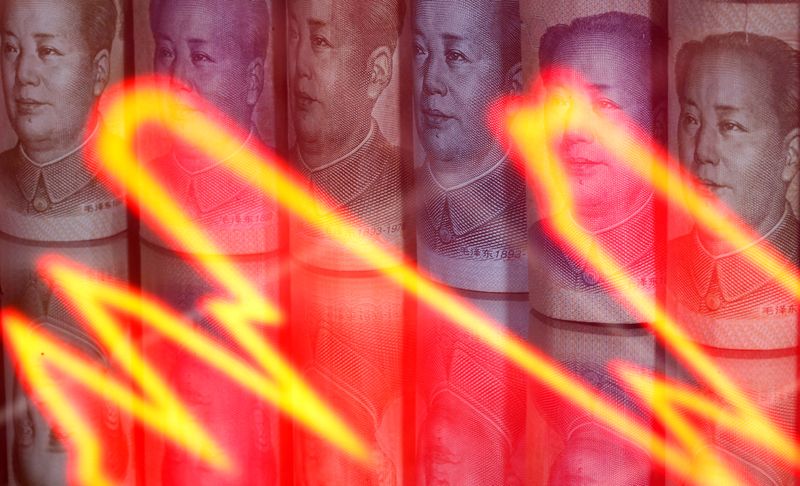(Corrects paragraph three to remove reference to Fidelity International being a U.S. asset manager)
By Summer Zhen
HONG KONG (Reuters) -After months of steering clear of China, global asset managers and hedge funds say they are seeing tentative signs of a recovery on the mainland and value in the country's depressed stock markets.
While foreign inflows only point to a tepid commitment from these funds so far, the rhetoric is changing as asset managers point to volatility in U.S. stocks and sudden policy impetus in China as reasons to return to the country.
Asset manager Fidelity International is highlighting China's looser monetary policy and the government's recent 1 trillion yuan ($137.10 billion) borrowing-and-spending sovereign bond plan as a tailwind for the country's stock markets.
“There are mixed pictures if you look globally, depending on your own sort of risk tolerance. Now I think it might be a time to shift from the U.S. into China,” said Marty Dropkin, head of equities, Asia Pacific at Fidelity International.
London-based £3 billion fund manager Somerset Capital Management likewise finds China exciting. Mark Williams, portfolio manager of its Asia Strategy, says easier monetary and fiscal policies have led to "attractive improvements in company earnings across our portfolio".
The fund is increasing exposure to sportswear and electric vehicle companies that will benefit from growing consumer demand.
Pessimism on China seems to have peaked this month as authorities in the world's second-largest economy announced bigger stimulus plans and state spending, and even measures to shore up the beleaguered property sector, though the developers' debt crisis may take years to untangle.
The stock market has yet to recover, but has stabilised. The MSCI China index is down 11% so far this year, while U.S. stock indexes S&P 500 and Nasdaq are up 15% and 32%, respectively. Japan’s Nikkei has gained 25%.
Morgan Stanley estimates long-only foreign investors now have their deepest underweight positions in China and Hong Kong equities in years. These funds have offloaded nearly $10 billion worth of Chinese equities in the past three months, the largest cumulative outflows since 2018, the bank said.
Chinese stocks have cheapened as a result, to a price-to-earnings ratio of 11%, the lowest among major Asian markets.
Patrick Ghali, managing partner of Sussex Partners, a London-based hedge fund advisory, says clients who used to say "we don't want any allocation to China" are now thinking of contrarian entry points into the market and of re-engaging.
TURNING POSITIVE
Morgan Stanley data also shows a light turnaround in flows. Foreign investors bought $924 million of China A-shares via the Hong Kong-China Stock Connect link from Nov. 2 to 8, the first week of net inflows since the beginning of August.
The benchmark Hong Kong stock index has risen 1.7% this month after three consecutive months of losses, led by a surge in healthcare and tech shares. And, the Hang Seng Tech Index is up 5.1% so far in November.
The International Monetary Fund also upgraded its 2023 China economy growth forecast to 5.4% last week.
Boston-based investment firm Cambridge Associates says some Middle East investors find China's cheap valuations alluring and are allocating money there.
Hong Kong-based hedge fund Triata Capital expects attractive risk-reward in internet and e-commerce giants, saying excess investor pessimism had distorted valuations.
“Investors are under-appreciating the substantial upside within (AI-related) software and internet over the long-term,” said Sean Ho, chief investment officer of Triata Capital.
Hedge funds typically do not publicly reveal their positions, but disclose them to investors and distributors, through investor letters.
Vivek Tanneeru, portfolio manager at Matthews Asia, a San Francisco-based asset manager, said he maintains an overweight position on China in anticipation of a sentiment boost from improved consumer confidence and warmer U.S.-China relations.
Tanneeru is adding select industrial, travel services, and medical services companies to his portfolio.
Some analysts, however, do not expect the feel-good factors will last.
Chinese stocks could see a short-term sentiment pick-up given foreign funds have such light positions in the market, said Redmond Wong, Greater China market strategist at Saxo Markets.

"But there are rising concerns about China's long-term productivity and growth strategies", he said, referring to the government's often stated priorities around governance and anti-corruption efforts.
($1 = 7.2939 Chinese yuan renminbi)